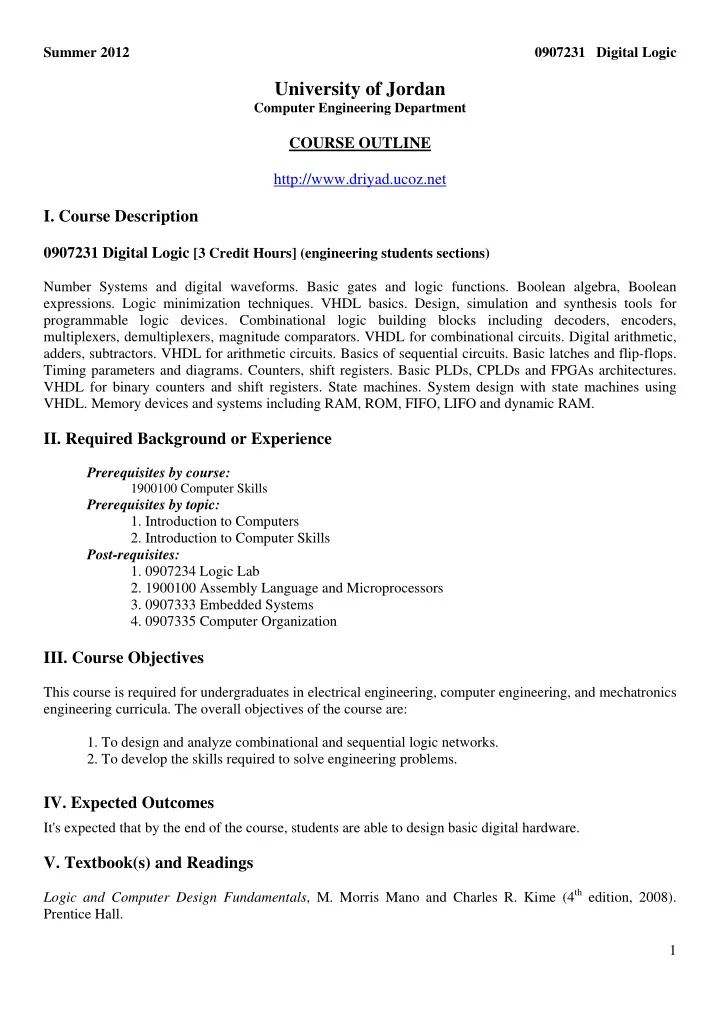

Summer 2012 0907231 Digital Logic University of Jordan Computer Engineering Department COURSE OUTLINE http://www.driyad.ucoz.net I. Course Description 0907231 Digital Logic [3 Credit Hours] (engineering students sections) Number Systems and digital waveforms. Basic gates and logic functions. Boolean algebra, Boolean expressions. Logic minimization techniques. VHDL basics. Design, simulation and synthesis tools for programmable logic devices. Combinational logic building blocks including decoders, encoders, multiplexers, demultiplexers, magnitude comparators. VHDL for combinational circuits. Digital arithmetic, adders, subtractors. VHDL for arithmetic circuits. Basics of sequential circuits. Basic latches and flip-flops. Timing parameters and diagrams. Counters, shift registers. Basic PLDs, CPLDs and FPGAs architectures. VHDL for binary counters and shift registers. State machines. System design with state machines using VHDL. Memory devices and systems including RAM, ROM, FIFO, LIFO and dynamic RAM. II. Required Background or Experience Prerequisites by course: 1900100 Computer Skills Prerequisites by topic: 1. Introduction to Computers 2. Introduction to Computer Skills Post-requisites: 1. 0907234 Logic Lab 2. 1900100 Assembly Language and Microprocessors 3. 0907333 Embedded Systems 4. 0907335 Computer Organization III. Course Objectives This course is required for undergraduates in electrical engineering, computer engineering, and mechatronics engineering curricula. The overall objectives of the course are: 1. To design and analyze combinational and sequential logic networks. 2. To develop the skills required to solve engineering problems. IV. Expected Outcomes It's expected that by the end of the course, students are able to design basic digital hardware. V. Textbook(s) and Readings Logic and Computer Design Fundamentals , M. Morris Mano and Charles R. Kime (4 th edition, 2008). Prentice Hall. 1
Summer 2012 0907231 Digital Logic VI. Student Materials Text book, class handouts, lecture notes, power point slides, and other resources posted regularly on website of the course. VII. College Facilities Classroom with black and white boards and projection facilities; library; and computer facilities. VIII. Evaluation of Outcomes Evaluation will be done based on the following (percentages other than midterm and final exams are up to the instructor): 1. Quizzes: 20% (Two quizzes) 2. Midterm Exam : 30% 3. Final Exam : 50%; IX. Course Topics Topic Book Sections Introduction Chapter 1 Number Systems and Codes Sections 1 through 7 Combinational Logic Circuits Chapter 2 Gates, Boolean Algebra, Standard Forms Sections 1, 2, 3, 4 Combinational Logic Circuits Two-level Circuit Optimization Map Manipulation Chapter 2 Other Gate Types Sections 4,5,8,9,10 Exclusive-OR function High Impedance Outputs Quiz 1 Combinational Logic Design Procedure Chapter 3 Sections 1 through 9 Functional Blocks Decoders, Encoders, and Multiplexers Chapter 6 Programmable Logic Section 6-8 Midterm Exam (TBA) Chapter 4 Arithmetic Functions Sections 1 through 5 Sequential Circuits Chapter 5 Definitions, Latches, Flip-flops Sections 1,2,3 Quiz 2 Sequential Circuits Chapter 5 Analysis and Design Sections 4 and 5 Chapter 7 Registers and Counters Sections 1, 6 Memory Basics Chapter 8 Final Exam (TBA) 2
Summer 2012 0907231 Digital Logic X. Instructional Methods 1. Lectures. 2. Quizzes. The course has the web site: http://www.driyad.ucoz.net. At the course web site you can access course material including lecture notes and class announcements. You are responsible for checking the course web site. If you make an error because you did not check the Web, you will still be held fully responsible. Grades will also be posted. Class Policies • Quizzes : are given at the beginning of Sunday class of designated week. There will be 2 quizzes throughout the semester. There will be no make-up quizzes for any reason. • Exams: All exams (including the final exam) will be closed book exams. The final exam will be comprehensive, covering material from the entire course, although the last third of the course will be emphasized. • Makeup Midterm : There will be no make-up for the midterm . In case of medical/ or other disabling emergencies, the instructor should be notified before the midterm and his approval for missing the midterm should be obtained before the midterm. If for any reason the instructor could not be reached, the department secretary should be notified before the midterm. The phone number is 535-5000 Extension 23000. • Grading Corrections : Ask the instructor for any grading correction requests within a week of returning the exam/quiz papers . After that, your grade will not be adjusted. If you find any mistake in grading, please let the instructor know. Your grade will not be lowered. • Class Attendance: Class attendance will be taken. University regulations regarding attendance will be strictly enforced. If you miss class, you must obtain the covered material from a willing classmate and or the course web site. The instructor will not be available (during office hours or other times) to repeat material covered in class. Course Instructors Sections Time Room Instructor Office Hours e-mail Middle 1 9:10-10:10 S, T , Th Auditorium Dr. Iyad Jafar iyad.jafar@ju.edu.jo 10:20 -11:20 2 11:30 – 12:30 Alkhateeb Hall 3
Recommend
More recommend